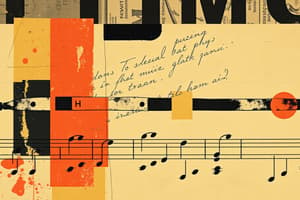Podcast
Questions and Answers
When discussing the speed of a piece of music, you are discussing the _____.
When discussing the speed of a piece of music, you are discussing the _____.
Tempo
What does the term 'crescendo' reference?
What does the term 'crescendo' reference?
Dynamics that gradually get louder
When listening to music, what should you listen for to engage your mind? (Select all that apply)
When listening to music, what should you listen for to engage your mind? (Select all that apply)
- Emotion and character (correct)
- Musical elements (dynamics, tempo, etc.) (correct)
- Instruments and instrumental families (correct)
- Pattern recognition (correct)
A piccolo has a lower pitch-range than a clarinet.
A piccolo has a lower pitch-range than a clarinet.
If 'op 20, no. 3' was printed next to a work, what would that indicate?
If 'op 20, no. 3' was printed next to a work, what would that indicate?
In a piece of music with one melody and no harmony, it can be described as what?
In a piece of music with one melody and no harmony, it can be described as what?
The composer always leads the orchestra while the conductor always writes the music.
The composer always leads the orchestra while the conductor always writes the music.
List these brass family instruments from highest in pitch-range to lowest: Trumpet, Horn, Trombone, Tuba.
List these brass family instruments from highest in pitch-range to lowest: Trumpet, Horn, Trombone, Tuba.
What do the terms Allegro, Andante, Scherzo, and Allegro represent in a classical music concert program?
What do the terms Allegro, Andante, Scherzo, and Allegro represent in a classical music concert program?
How does a wind ensemble differ from an orchestra?
How does a wind ensemble differ from an orchestra?
If someone is discussing the highness or lowness of sound, they are discussing the _____.
If someone is discussing the highness or lowness of sound, they are discussing the _____.
Consonant sounds always want to go to dissonant sounds.
Consonant sounds always want to go to dissonant sounds.
What describes the texture when bagpipes use several pipes to create drones underneath the melody?
What describes the texture when bagpipes use several pipes to create drones underneath the melody?
If the notes of a melody are short, disconnected, and jumpy, those notes are _____.
If the notes of a melody are short, disconnected, and jumpy, those notes are _____.
To play the oboe, the performer holds the instrument vertically in front of the body.
To play the oboe, the performer holds the instrument vertically in front of the body.
A Major triad can be described as what? (Select all that apply)
A Major triad can be described as what? (Select all that apply)
If you play more than one note on a piano at the same time, you have just played what?
If you play more than one note on a piano at the same time, you have just played what?
What makes the theremin unique compared to most other instruments?
What makes the theremin unique compared to most other instruments?
What musical form is described using A A1 A2 A3 A4 A5?
What musical form is described using A A1 A2 A3 A4 A5?
Arrange the following music periods into chronological order: Medieval, Renaissance, Baroque, Classical, Romantic, Twentieth/Twenty-First Centuries.
Arrange the following music periods into chronological order: Medieval, Renaissance, Baroque, Classical, Romantic, Twentieth/Twenty-First Centuries.
Handel's famous 'Hallelujah' Chorus comes from within what larger work?
Handel's famous 'Hallelujah' Chorus comes from within what larger work?
Who composed the opera 'Dido and Aeneas'?
Who composed the opera 'Dido and Aeneas'?
Match these music styles with the time period that they originated from:
Match these music styles with the time period that they originated from:
What was Gregorian Chant?
What was Gregorian Chant?
Which of these is the oldest example of notated music?
Which of these is the oldest example of notated music?
The term madrigalism was often synonymous with what other term?
The term madrigalism was often synonymous with what other term?
What is J.S. Bach's 'Coffee Cantata' about?
What is J.S. Bach's 'Coffee Cantata' about?
1450-1600 marks the years of which musical period?
1450-1600 marks the years of which musical period?
Flashcards are hidden until you start studying
Study Notes
Tempo and Dynamics
- Tempo refers to the speed at which a piece of music is played.
- Crescendo indicates a gradual increase in loudness within a musical piece.
Active Listening in Music
- Engage with instruments and instrumental families.
- Pay attention to musical elements such as dynamics and tempo.
- Connect with the emotion and character conveyed in the music.
- Practice pattern recognition to enhance listening skills.
Music Structure and Terms
- Monophony describes music featuring a single melody without accompanying sounds or harmony.
- A Major triad is characterized as consonant and consists of three notes.
- A chord is formed by playing multiple notes on a piano simultaneously.
Instrument Families
- Piccolo has a higher pitch range compared to the clarinet.
- Brass family instruments arranged from highest to lowest pitch are: Trumpet, Horn, Trombone, Tuba.
- Wind ensembles lack a full string family compared to orchestras.
Composition and Performance
- A composer does not necessarily conduct; the roles of composer and conductor are separate.
- The association of terms like Allegro or Andante with a symphony corresponds to its different movements.
Textures and Articulations
- The texture created by the bagpipes, which includes drones under the melody, is homophonic.
- Notes that are short, disconnected, and jumpy are described as staccato.
Historical Context and Notation
- The first documentation of music notation emerged during the Medieval period with Gregorian Chant.
- The Seikilos Epitaph represents the oldest known example of notated music.
- Music periods in chronological order: Medieval, Renaissance, Baroque, Classical, Romantic, Twentieth/Twenty-First Centuries.
Significant Works and Composers
- Handel's "Hallelujah" Chorus is part of the larger work Messiah.
- Henry Purcell composed the opera Dido and Aeneas.
- J.S. Bach's Coffee Cantata centers on a young woman's coffee addiction and her father’s attempts to help her overcome it.
Musical Styles and Techniques
- Madrigalism is closely associated with word painting, a technique where the music illustrates the meaning of the lyrics.
- The term "theme and variations" is indicated by the structure A A1 A2 A3 A4 A5.
Summary of Musical Periods
- The Renaissance period is identified by the years 1450-1600.
- Significant transformations in musical styles emerged during each historical period, influencing the evolution of western music.
Studying That Suits You
Use AI to generate personalized quizzes and flashcards to suit your learning preferences.




